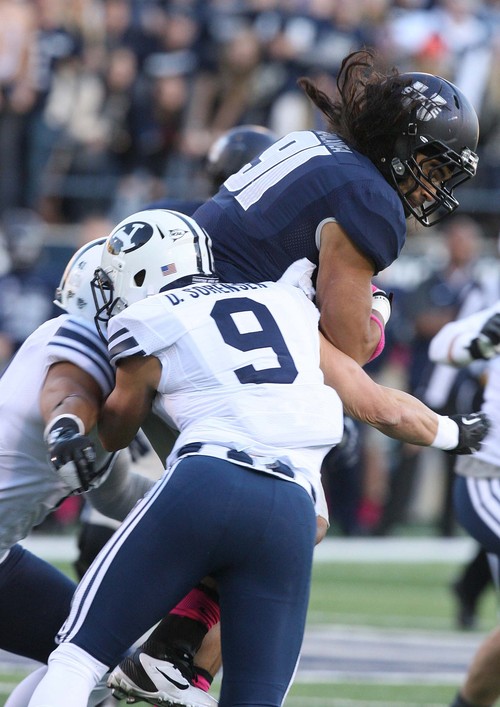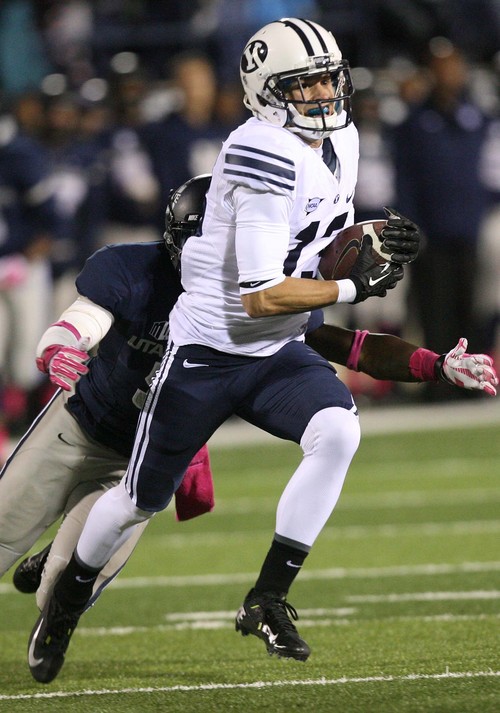This is an archived article that was published on sltrib.com in 2013, and information in the article may be outdated. It is provided only for personal research purposes and may not be reprinted.
Who would have thought that a few weeks into the season, this would look more like a battle of triple option teams than BYU's passing offense versus Georgia Tech's patented rushing approach? It appears the Cougars have evolved to a new approach to winning games, prioritizing the rushing talents of quarterback Taysom Hill over the sophomore's arm. After losing out to Utah, BYU is on a mini-roll, throttling Middle Tennessee State and handling Utah State in Logan. Georgia Tech has an identical record to BYU, 3-2, but is coming off two division losses to Miami and Virginia Tech. Here's a position-by-position look at this week's matchup and which team will have the edge heading into Saturday's game:
Quarterback
Taysom Hill turned in his first competent performance as a passing quarterback last week against Utah State. He was 17-for-31 on passing attempts, with three touchdowns, 278 yards and an interception against an above average Utah State defense. The coaches actually reigned in his usual strength as he rushed for only 14 yards on nine carries, his lowest total since rushing for 57 yards against Virginia in the season opener. Hill is still struggling overall in the passing game, however, completing only 43 percent of his passes with four touchdowns and five interceptions.
Sophomore Vad Lee is Georgia Tech's starter and has had similar struggles as Hill when trying to throw the ball. Lee is a 45 percent passer with seven touchdowns and four interceptions and is averaging only 125 yards per game. However, Georgia Tech rarely tries to beat opposing teams through the air and Lee has fared well when running the ball. He has rushed for 241 yards and three touchdowns this season.
Edge: BYU
Running back
Jamaal Williams is back for BYU and looked like he was totally healthy against Utah State, rushing for 79 yards against the Aggies last week. Williams has 457 yards rushing this season and is spelled by Mike Alisa and Paul Lasike, who have combined for 266 yards and four touchdowns. However, between the three running backs, they have only four touchdowns with zero for Williams and two coming for Alisa against Middle Tennessee. Hill is a threat rushing the ball and leads the team with 579 yards and six touchdowns, but it appears the coaches are limiting his rushing attempts as the season goes along.
The strength of Georgia Tech has always been its running game through the triple option and this year is no different. Senior back David Sims is the backbone of the Yellow Jacket offense, with six touchdowns and 325 yards rushing. Robert Godhigh and Zach Laskey are the other guys getting an opportunity to share the load, with 381 yards and a touchdown. After struggling against Virginia Tech, the Georgia Tech rushing attack came alive against Miami, racking up 335 yards and four touchdowns.
Edge: Georgia Tech
Receivers
Mitch Matthews came out of nowhere for the Cougars last week, torching Utah State's secondary for three touchdowns and 112 yards. His performance couldn't have come at a better time as BYU desperately needed someone to separate themselves at receiver. Before Matthews' game last week, BYU had squeezed out only a single 100 yard performance from a receiver in five games, a horrendous stat. Cody Hoffman has still struggled to get it going after an injury and one game suspension, while only one other Cougar receiver has a touchdown in the passing game.
Even if Georgia Tech is a run first team, they're still easily outpacing BYU in the receiving department. Junior DeAndre Smelter leads the team with 185 receiving yards and two touchdowns, while Godhigh is a passing threat out of the backfield and is second on the team with 136 yards and two touchdowns. Junior Darren Waller is another option and has 107 yards and a touchdown of his own. The Yellow Jackets only throw when they have to, but their receivers are finding the endzone fairly regularly.
Edge: Even
Offensive Line:
BYU gave up two sacks against Utah State and has now surrendered at least one sack in four of five games this season. The offensive line has yet to find its consistency and forces Hill to duck and run too often still when he senses pressure around him, giving up 11 sacks total in 2013.
Georgia Tech's offensive line has held up better than BYU's surrendering only five sacks this season with three coming in the last two games. It's not an exact comparison because the Yellow Jackets drop back far less to pass than Hill is in the BYU offense, but in general and against better opposing defenses, Georgia Tech has done a better job up front.
Edge: Georgia Tech
Defensive Line and Linebackers:
The Cougars' strength continues to be on the defensive front. The team has racked up six sacks and 26 tackles for loss, with a change to improve that number if they can get to the Georgia Tech rushers in the backfield. Despite a lean game against Utah State in the sack department, the unit still limited Joey DeMartino to under 90 yards rushing and gave up zero rushing touchdowns, potentially skewed by the Chuckie Keeton injury. Kyle Van Noy and Alani Fua continue to be the lynchpins of the BYU defense, but Uani' Unga is no slouch either, racking up 16 tackles against Utah State.
Georgia Tech's defense is led by defensive linemen Adam Gotsis and Jeremiah Attaochu. The duo has combined for seven tackles for loss and three sacks this season, including a tackle for loss and a sack last week against Miami from Attaochu. Overall, the Georgia Tech front seven is well-rounded, with eight players with at least one tackle for loss, 19 total tackles for loss and seven total sacks.
Edge: BYU
Defensive backs
BYU's pass defense has been OK this season, holding opponents to only 196 yards per game on average, while surrendering nine touchdowns. Craig Bills is still the go-to defensive back for BYU with 26 tackles, five pass breakups and an interception in 2013. The Cougar defensive backfield won't be called upon to stop an air raid offense this weekend, but will have to stay on guard for play action fakes.
Georgia Tech has surrendered fewer touchdowns than BYU (six), but has given up 210 yards per game. Miami hung 324 yards through the air on Georgia Tech while Virginia Tech had 276 yards of its own against the Yellow Jacket secondary. Defensive backs Jemea Thomas and Louis Young are players to watch for in the Georgia Tech secondary. They have combined for six pass breakups and an interception.
Edge: BYU
Prediction:
If you like read option football, this is the game for you as this contest should be waged between two run-oriented offenses. The difference will be Hill's incremental improvements in the passing game. He should be able to make enough plays through the air and the BYU front seven will do enough to limit the Georgia Tech triple option to secure a 17-13 win.







